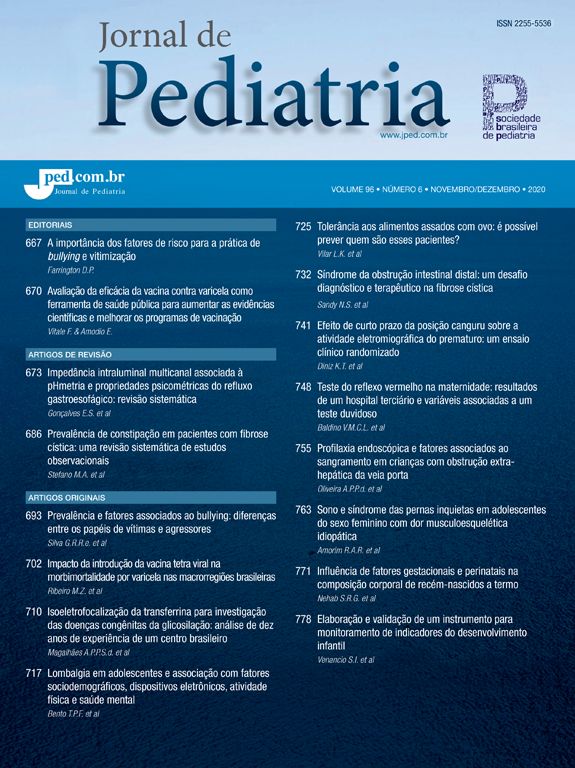To draw pediatricians' attention to an enzyme deficiency in the urea cycle, as the prognosis of this disease is directly related to early diagnosis and treatment. Methods: We describe the case of a newborn who presented with lethargy, vomit and seizures 48 hours after birth. After examination, we diagnosed ornithine transcarbamylase deficiency. Treatment was started immediately. Results: We followed up the patient until he was 1 year old, when he underwent liver transplantation. Outcome was good. Conclusion: Ornithine transcarbamylase deficiency is a rare and very serious disease. Any newborn whose evolution is similar to that of a septic patient but has no infection must be investigated for this disease. Prognosis is directly related to early diagnosis and treatment.
MethodsWe describe the case of a newborn who presented with lethargy, vomit and seizures 48 hours after birth. After examination, we diagnosed ornithine transcarbamylase deficiency. Treatment was started immediately. Results: We followed up the patient until he was 1 year old, when he underwent liver transplantation. Outcome was good. Conclusion: Ornithine transcarbamylase deficiency is a rare and very serious disease. Any newborn whose evolution is similar to that of a septic patient but has no infection must be investigated for this disease. Prognosis is directly related to early diagnosis and treatment.
ResultsWe followed up the patient until he was 1 year old, when he underwent liver transplantation. Outcome was good. Conclusion: Ornithine transcarbamylase deficiency is a rare and very serious disease. Any newborn whose evolution is similar to that of a septic patient but has no infection must be investigated for this disease. Prognosis is directly related to early diagnosis and treatment.
ConclusionOrnithine transcarbamylase deficiency is a rare and very serious disease. Any newborn whose evolution is similar to that of a septic patient but has no infection must be investigated for this disease. Prognosis is directly related to early diagnosis and treatment.
Alertar os pediatras para a deficiência de enzimas do ciclo da uréia. Essa patologia deve ser lembrada, pois o prognóstico do recém-nascido está diretamente relacionado com a precocidade do diagnóstico e a instituição de uma terapêutica adequada.
MétodoApresentamos um paciente que, após 48 horas de vida, iniciou com quadro de sonolência, letargia, vômitos e convulsão, tendo-se pensado, inicialmente, em sepsis neonatal. Após excluído esse diagnóstico, foi diagnosticada deficiência de ornitina transcarbamilase (OTC).
ResultadoO paciente foi tratado e acompanhado até a idade de um ano, quando foi submetido ao transplante hepático com boa evolução e controle da doença.
ConclusãoA deficiência de ornitina transcarbamilase (OTC), é rara, porém muito grave. O recém-nascido que apresentar um quadro clínico semelhante ao de um recém-nascido séptico, porém sem contexto infeccioso, deve ser investigado para essa patologia, pois o prognóstico está diretamente relacionado com a rapidez do diagnóstico e do tratamento.








